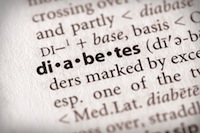
Diabetic macular edema causes blindness primarily as a result of retinal swelling. Parts of the retina can accumulate a buildup of fluid and protein which leads to swelling. In people aged 20 to 70, diabetes-related eye disease is one of the leading causes of vision lost.
While diabetes has many causes, recent Lipitor diabetes lawsuits claim that Lipitor contributed to diabetes in some women, putting these women at risk for complications such as vision loss. Lipitor has been linked to increasing blood sugar in many people.

The study calls for closer review of diabetes patients for vision deficiencies and the risk of vision loss. This assessment should be even more frequent in demographics of more concern, specifically blacks and Hispanics. In identifying a condition early, patients can monitor blood sugar levels and vision changes more carefully to reduce the risk of lasting damage. The author of the study believes that there is a lack of necessary screening for vision deficiencies especially in populations at risk.
While black Americans had the highest rate of diabetic macular edema, diabetes itself is most prevalent in the Hispanic population. According to the CDC, nearly 26 million Americans were living with diabetes in 2010.
Lopez McHugh is currently investigating cases where women who took the cholesterol drug Lipitor developed diabetes. If you are a woman who was diagnosed with new-onset, Type II diabetes while taking Lipitor, then you may be eligible for compensation through a Lipitor diabetes lawsuit. If your or a loved one developed diabetes after taking Lipitor, contact us at (877) 737-8525 or online for a free initial consultation. Contact us now because each state has strict deadlines for filing a lawsuit.
